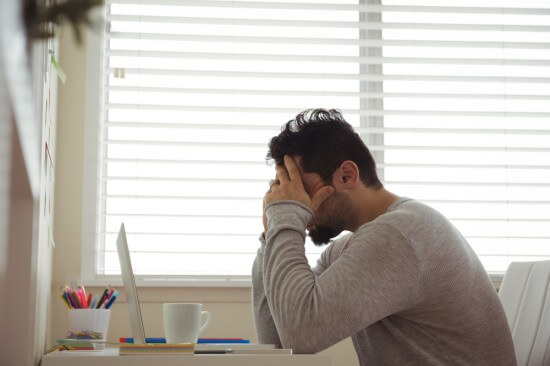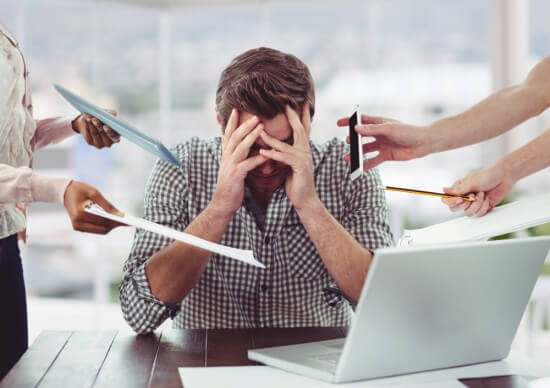How to Identify your Stress? Know your Eustress and Distress.
By Prapoorna M
Last Updated: November 27, 2021
Are you feeling weak or old suddenly? Have you ever wondered, “Gone days are golden days; now its tension and worry everywhere; where has my peace gone?” It’s great that you are being able to feel the difference, at least, rather than running in the rat race.
In our daily life, apart from coping up with the daily activities and troubles, few things also run unrecognizably as subtle thoughts. These thoughts take a major part in balancing the mental state of the mind. The tension and anxiousness they create lead to the Stress. It was found that at least one out of five people experience stress which is actually high levels of negative stress stretching at least 15 days or more per month.
When stress is considered as something that occurs repeatedly across the full lifespan, the true incidence of stress problems is much higher. Being stressed out has thus become a universal human phenomenon that affects almost everyone. Stress is of both positive and negative kinds and we have already experienced them often. Stress is actually a reaction to a changing and demanding environment. To be more frank, Stress is about our capacity to handle the change though it makes us feel good or bad.
Identify the Stress
Having too much of pressure build up about something in your mind, leads to stress which can be related to work, home or may be from personal aspects. It could also be the combination of many. Most of the times, it is the people around you who could identify your stress, while it might not be easy for yourself. Let’s go through some of the symptoms which could help you out in tracking your stress. There are many symptoms with which one can identify stress, such as Psychological, Emotional, Physical, and Behavioral symptoms.

Let’s have a look at all of them.
Psychological symptoms
- Depression: Feel down many of the times
- Anxiety: Having a continuous tensed thought running all the time
- Forgetfulness: Memory lapses are observed often
- Distractions: Lack of concentration on any work
- Constant worry: Pondering over something while doing some other thing
- Missing Creativity: Unable to think of something new or of a solution
- Missing Decisiveness: Missing the ability to make confident decisions.
Emotional Symptoms
- Getting Sensitive: Unable to handle criticism, getting so tearful always, getting hurt by simple words and negligence by friends and family etc.
- Out of Control: Getting emotional or angry suddenly, feeling defensive, irritated and frustrated, high mood swings and lack of confidence and self-esteem etc.
Behavioral Symptoms
- Addiction: Increase consumption of alcoholic beverages, smoking, caffeine intakes, doing drugs etc. to compensate inner tension.
- In a Cocoon: Becoming a workaholic, absenteeism, lack of self-concern, social withdrawal, neglecting appearance, no attention towards pleasurable activities, poor time and work management etc.
- Oops: Lying uncharacteristically, getting prone to accidents, brooding, heavy forgetfulness
- Extremes: Becoming too reckless or too nervous, having problems in relationship, Insomnia etc.
Physical Symptoms
There are numerous problems that occur with stress, such as weight loss, weight gain, hyperventilating, panic attacks, constipation or diarrhea, aches, allergies, infections, dizziness, Libido or sexual problems, menstrual problems, hormonal imbalances etc.
What Stress actually is?
Stress can be understood as our body’s response to a threat and often a short-term experience. This response occurs when our mind senses a threat. This could actually be positive or negative. Positive stress is something which drives us towards a vision and motivates or encourages us, while negative stress is something which pulls us back, creates tensions and illusions, making us think of all the negative consequences etc. The positive stress is called as Eustress and the negative stress is termed as Distress.
Eustress or Positive Stress
Stress involves the set of emotional, physical and cognitive reactions to a change. This change can be good, making the stress considered as Positive stress or Eustress. Such changes excite us in different ways. For example, getting married creates a stress which is welcoming. When a player gets ready for a tournament, the tension he feels makes him stressed but he could take it and handle it to get a score. In fact, a complete lack of stress or tension in such player creates lethargy and boredom.
So, a small amount of positive stress is always good. It is already there in our experience that we feel high and low levels of this stress. Depending upon the requirements and expectations on us, we feel highly stressed to meet them and achieve better. Conversely, when we have everything fine and there’s nothing much to do to prove ourselves or to cope up with the situation, we feel low tensed or carefree.
Symptoms of Eustress
- Positive stress exists for a shorter term
- It motivates us
- Lets us focus our energy
- Makes us feel excited
- Improves performance
- Perceived as being there within our capabilities
Distress or Negative Stress
Negative stress or Distress, when exists in an individual, the anxiety levels get high with a sense of unpleasantness clouding over. Distress squeezes out the energy making the person tensed and weak. This creates a feeling of helplessness wherein a person could feel it as his incapability.
Negative stress can be caused by a numerous factors such as death of spouse or a family member, hospitalization of loved ones being abused, bullied or neglected, divorcing the life partner or getting separated from partner, legal problems, Unemployment, financial problems etc. which are practically countless. The level of the negative stress on a person depends on how the individual reacts.
Symptoms of Distress
- Negative stress can exist for a shorter or longer term
- It causes anxiety and concern
- Makes us feel unpleasant
- Decreases our performance
- This can lead to mental and physical problems
- It is perceived as outside of our coping abilities
Factors of Stress
There are various factors that determine whether a particular situation could result in Eustress or Distress. It depends upon how the individual thinks, emotes and reacts. The stress of a person depends on how he thinks about the stressor and how he perceives his capabilities of handling it, how intensely it creates demands on him, how long it lasts etc. all the factors collectively express whether he faces stress or not and what kind of stress it would be.

For example, an employee may face situations like job insecurity, lack of proper training for the job and excessive job demands, differences of opinions and conflicts with teammates or colleagues, inadequate authority that is necessary to carry out the tasks in job, making presentation before everyone, unproductive and time consuming meeting, commuting to office and having business trips etc. facing which he goes through a lot. Factors creating stress are called as Stressors.
These stressors are not always limited to situations where some external situation is creating a problem. Internal events such as feelings and thoughts and the habitual behaviours can also cause negative stress. The common internally caused sources of distress include fears, repetitive thought patterns, worrying about future events, unrealistic and perfectionist expectations etc. can be the causes.
The habitual behavioural patterns also lead to distress, including overscheduling, failing to be assertive, Procrastination or failing to plan ahead etc.
Converting Distress to Eustress
Is it possible to convert the distress into Eustress? Just like an answer to this, Dr.Lazarus and Dr.Folkman described the importance of the cognitive appraisal process in determining whether stress is positive or negative. There believed to be are two aspects to cognitive appraisal, called as Primary and Secondary appraisal.
Primary Appraisal
In this, we evaluate whether we really have to worry about the problem and if we have anything stake at the encounter. A stressor that is perceived as important is more likely to cause stress reaction than a stressor that is viewed as relatively trivial.
Secondary Appraisal
In this, we evaluate whether we can cope up with the situations we have. The factors like how much energy we have, how much money or equipment we have, the ability to face the challenge, our options, availabilities etc. make us ready for the situation to be faced. When we understand how much we are fine to cope up the resources, the distress can be converted to
Eustress.
Stress could spring from any source and can at times be over whelming that we can’t ourselves come out of it. We at Wellness Hub extend a helping hand for you to come out of any negative shades of your life and lead a positive and happy life, here after. Step in or call us to have an ending to your troubles. Experienced psychologists are available for your convenience and both offline and online counselling include chat, phone and video counseling sessions are also available here.
Book your Free Consultation Today
Parent/Caregiver Info:
Client’s Details:
* Error Message









